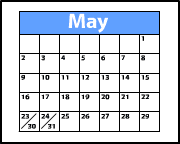 With state tests behind them and the school year winding down, many students (and teachers) might be inclined to relax and enjoy the slide into summer. That's why wise princpals often step into action at this time of year to encourage teachers to tackle cool projects that keep the learning alive as the countdown to summer gets underway.
With state tests behind them and the school year winding down, many students (and teachers) might be inclined to relax and enjoy the slide into summer. That's why wise princpals often step into action at this time of year to encourage teachers to tackle cool projects that keep the learning alive as the countdown to summer gets underway. I was reading an article the other day about a group of students in Virginia who were collecting their community’s history, and I thought, "Now there's one nice way to end a school year on a high note!" And then I began thinking of others.
STUDENTS GATHER COMMUNITY HISTORY
Teacher Dawn Henderson wanted to involve her students in learning about the history of their Richmond, Virginia, neighborhood, but her search for resources turned up painfully little. That spurred Henderson to write a grant and gather a group of students for a special after-school program that would gather information from neighbors before it was lost.
A tale of a trolley stop long forgotten… the legend of pirates who came up the river and buried gold… and the story of how a whole community came together to build a well for their school. Those are just a few of the stories that Henderson's fourth-graders at Bensley Elementary School in Richmond, Virginia, have learned about as they researched their community and talked with neighbors who have lived there for many years.
The result of Henderson’s project is a video history that students will finish up any day now. Eventually, that history will be gathered into book form too. [read more]
Meanwhile, middle school students in Pittsburgh are learning how to research, document, and record the history of their community. The students at Walter L. Parks Middle School are listening to and recording the life-stories and experiences of community elders. This spring, the students are putting together a video documentary that features those interviews and other stories. [read more]
MORE END-OF-YEAR IDEAS
As I think more deeply about what the students in Richmond and Pittsburgh are doing, I understand that a community-history project might be too involved to tackle at the end of the school year; indeed, it can take many months to bring such a project to fruition. But maybe a smaller project that investigates a specific event in town history; an event in national history as told through the words of locals; the history behind special landmarks around the community; or the history of your students’ own school might make an appropriate focus for a few weeks.
If none of those ideas sound doable, be sure to check out this Education World resource with more end-of-year fun and learning that I have gathered for you to pass along to teachers:
End-of-Year Lessons and Projects
The end of the school year can by a trying time for many teachers. That's because you're trying to teach and students are trying to get you to turn on the VCR or give them free time. There's no need to spend your last days of school on a guilt trip if you use these meaningful and fun activities.
MORE STUDENT-CREATED HISTORIES
Students in many schools have worked to gather the history of their neighborhoods and larger communities. A few more examples of such histories can be found at these links:
● Bridlemile Elementary School Oral History Project
● Ambler Elementary School: Oral Histories
● High School Students Interview Local Veterans of the Civil Rights Struggle (McComb, Mississippi)
● D.C. Everest Area Schools (Wisconsin) Oral History Project
● Hidden Stories, Discovered Voices: Maryland Students Collect African-American History
ADDITIONAL ORAL HISTORY RESOURCES
● Oral History
● All History Is Local: Students as Archivists
● Step-By-Step Guide to Oral History










